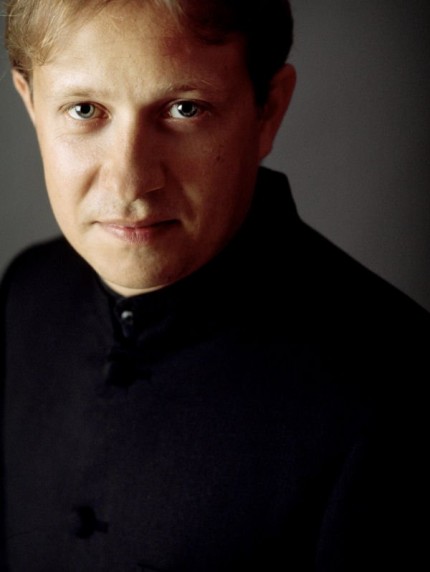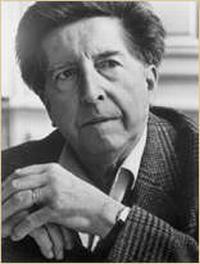CSO’s French program spotlights Chris Martin, 20th-century rarities

Debussy and Ravel are such invariable components of any symphonic program of French music that other Gallic composers tend to get crowded out.
Give credit to Ludovic Morlot for la route less taken. The French conductor elected to present two lesser-heard 20th-century works by two of his countrymen framing a pair of indigenous trumpet concertos performed by CSO principal, Christopher Martin.

Still active at 95, Henri Dutilleux is the greatest living French composer, and his singular qualities were resoundingly manifest in his Symphony No. 2.
Written in 1959 for the 75th anniversary season of the Boston Symphony, Dutilleux’s Second, subtitled Le double, is characteristically unorthodox in its conception, resources, and expression. A large chamber group of 12 players (string quartet, three winds, two brass, timpani, harpsichord and celesta) act as a kind of mega-solo band whose material is echoed, elaborated and developed with and against the large backing orchestra.
Dutilleux is not a sonata-allegro man. Instead he builds his larger structures from luminous textures and acutely colored fragments with subtle thematic morphing, often in the form of extended variations. Yet rather than sounding shapeless or prolix, there is a taut dramatic logic to this music that hold’s one’s attention.
The symphony opens with a mysterious string passage, moving through wind choirs and ominous timpani notes to a jagged surging main section. The middle Andantino is somber and inward looking, brooding yet not tragic with a pastoral middle section that builds to an emphatic climax. Even in his relaxed moments, Dutilleux artfully maintains tension as with the unsettling two-note brass motif that cuts through the flowing winds and strings.
The symphony concludes in a whirling Allegro with a jaunty jazz-inflected motif and brief epigrammatic solos for many of the chamber members. The argument builds considerable steam and seems on its way to a resounding close when the music suddenly slows, takes on a calmer expression and ends in the same mysterious cadence with which it began.
This is unique and compelling music and Morlot led the CSO members in a sweeping, dramatic performance that skillfully showcased Dutilleux’s ingenuity and iridescent scoring.
Albert Roussel’s four symphonies remain inexplicably neglected and it would have been a timely excavation had Morlot programmed one of these works. (Check out Stéphane Denève’s terrific recordings in his Roussel series on Naxos.)
Instead, Ludovic gave us Roussel’s “greatest hit,” the Suite No. 2 from his ballet, Bacchus and Ariadne. Though even this once-popular work isn’t performed as frequently these days, and hasn’t been heard at Orchestra Hall in 11 years.
Not for Roussel the limpid delicacy of Debussy’s faun or Ravel’s nymphs. Roussel’s ballet is just as smartly scored, but inhabits a rugged, darker-hued world.
Morlot, who takes the helm of the Seattle Symphony this fall, led a dynamic at times raucous performance that emphasized the weight and sharp edges of Rousel’s ballet music rather than its fleeting charms. The orchestra responded with worthy energy and commitment, though with many first-chair players off, instrumental solos lacked that last bit of distinctive character, Li-Kuo Chang’s expressive viola apart.
Framed by the the two larger works were a pair of French concertos, a vehicle for the remarkable talents of CSO principal trumpet Christopher Martin.

Martin’s gleaming tone, range of colors and stainless-steel technique were on full display in Andre Jolivet’s Concertino. This nine-minute caprice is not the deepest music ever written, but it served as an effective showpiece for Martin’s velvety tone, pinpoint articulation and seeming effortless virtuosity. Amy Briggs provided equally stellar support in the challenging piano part.
Henri Tomasi’s Trumpet Concerto is longer but even less substantive, like bad film music with a finale that is almost embarrassing in its banality. Martin elevated this piffle as much as possible, playing with consummate taste, a mellow oboe-like timbre in muted passages, and throwing off the challenges of the lightning finale with dazzling panache.
Did anyone write a decent trumpet concerto after Haydn and Hummel? This is one area of the repertoire that seems desperately in need of expansion. Perhaps the CSO can commission a concerto for Martin from a major composer that will prove equal to the considerable talents of their gifted principal.
The program will be repeated 1:30 p.m. Friday, 8 p.m. Saturday and 7:30 p.m. Tuesday. cso.org; 312-294-3000.
Posted in Performances





Posted May 20, 2011 at 2:51 pm by John Schmidt
Regarding your suggestion that the CSO commission a concerto for Chris Martin from a major composer, the CSO has in fact done so. The Edward Schmidt Family Fund that my family set up to commission new works for performance by CSO brass players has commissioned a concerto by Christopher Rouse that he is scheduled to complete in time for the 2013 season. The Fund commissioned the Karl Husa trumpet concerto that Bud Herseth premiered back in the 1980s as well as other works for trombone, horn and tuba–most recently John Williams horn concerto that was premiered by Dale Clevenger.
Posted May 22, 2011 at 9:00 pm by Andy
I loved the Tomasi piece. I guess I’m banal.